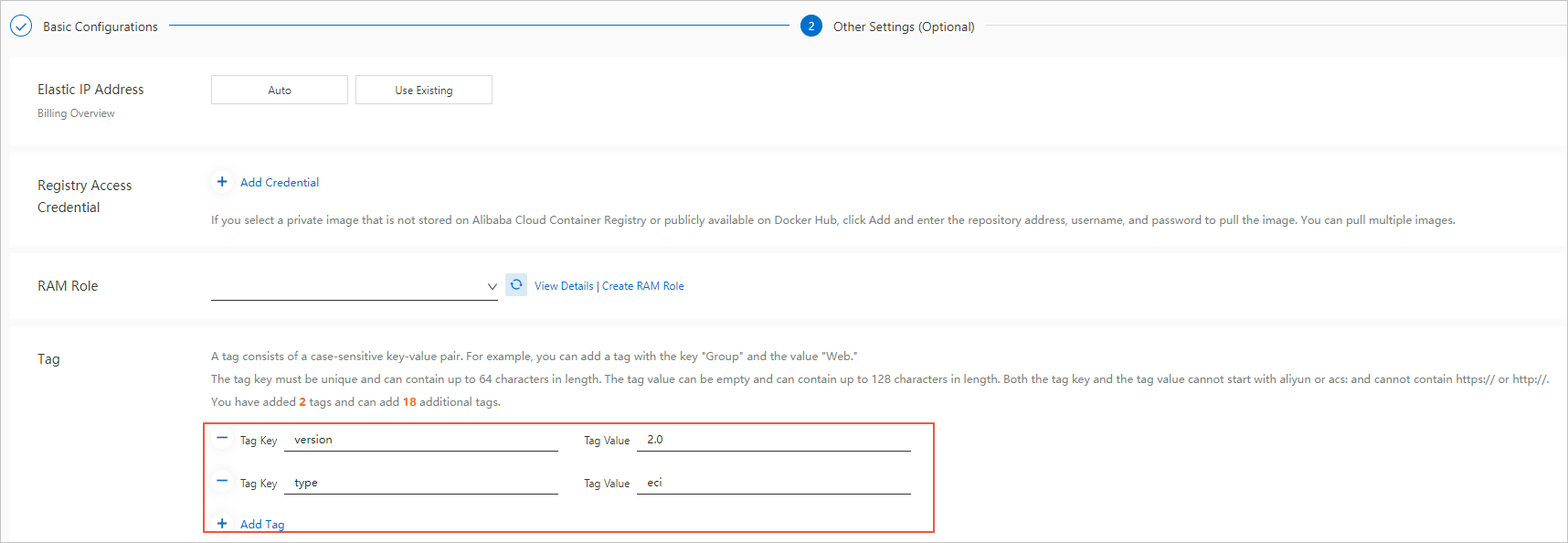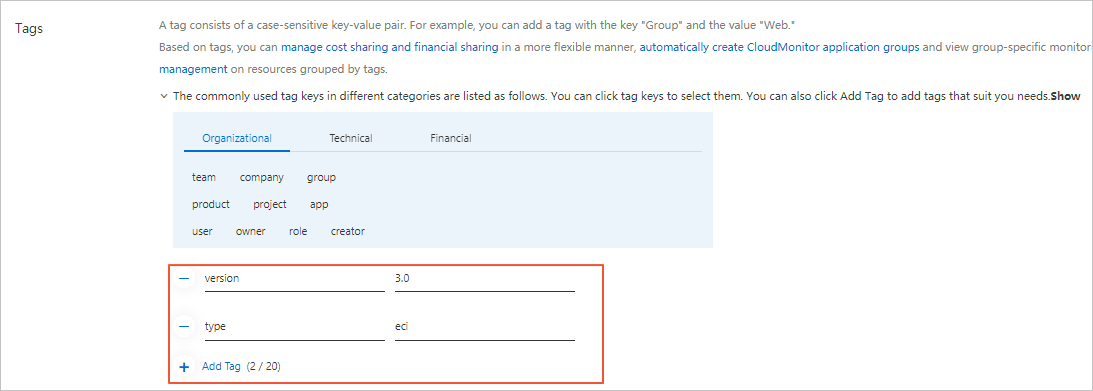タグは、エラスティックコンテナインスタンスを識別するために使用できるキーと値のペアです。タグを使用して、グループ別にエラスティックコンテナインスタンスを管理し、検索やバッチ操作を実行できます。
背景情報
API操作を呼び出すか、エラスティックコンテナインスタンスコンソールを使用してエラスティックコンテナインスタンスを使用または管理する場合、タグを使用して、同じ管理またはビジネス要件を共有するインスタンスをグループ化し、簡単に検索や操作を行うことができます。
タグを使用する場合は、次の制限事項に注意してください。
各タグは、タグキーとタグ値で構成されます。タグキーは一意である必要があります。
タグ情報はリージョン間で共有できません。
単一のエラスティックコンテナインスタンスには最大20個のタグを追加できます。
タグは個別に削除できません。
説明エラスティックコンテナインスタンスが削除されると、インスタンスに追加されたタグも削除されます。
タグを持つエラスティックコンテナインスタンスを作成する
OpenAPI
CreateContainerGroup操作を呼び出してエラスティックコンテナインスタンスを作成する場合、タグ関連のパラメーターを使用してタグを指定できます。次の表にパラメーターを示します。詳細については、CreateContainerGroupを参照してください。
パラメーター | タイプ | 例 | 説明 |
Tag.N.Key | 文字列 | version | タグNのキー。Nの有効値:1〜20。 タグキーは空の文字列にすることはできず、一意である必要があります。タグキーは最大64文字で、 |
Tag.N.Value | 文字列 | 2.0 | タグNの値。Nの有効値:1〜20。 タグ値は空の文字列にすることができます。タグ値は最大128文字で、 |
コンソールモード
エラスティックコンテナインスタンスコンソールのインスタンス購入ページでエラスティックコンテナインスタンスを作成する場合、その他の設定手順でインスタンスにタグを追加できます。

エラスティックコンテナインスタンスのタグを照会する
OpenAPI
DescribeContainerGroups操作を呼び出してエラスティックコンテナインスタンスを照会する場合、Tagsレスポンスパラメーターはインスタンスのタグを示します。Keyレスポンスパラメーターはタグキーを示し、Valueレスポンスパラメーターはタグ値を示します。詳細については、DescribeContainerGroupsを参照してください。
コンソールモード
エラスティックコンテナインスタンスコンソールのエラスティックコンテナインスタンスページに移動します。タグを照会するインスタンスを見つけ、[タグ]列のアイコンにポインターを移動して、次の図に示すようにインスタンスのタグを表示します。

タグを使用してエラスティックコンテナインスタンスをフィルタリングする
エラスティックコンテナインスタンスにタグを追加した後、タグを使用してインスタンスを検索したり、認証したりできます。
OpenAPI
DescribeContainerGroups操作を呼び出してエラスティックコンテナインスタンスを照会する場合、タグ関連のパラメーターを使用してインスタンスをフィルタリングできます。詳細については、DescribeContainerGroupsを参照してください。
コンソールモード
エラスティックコンテナインスタンスコンソールのエラスティックコンテナインスタンスページで、タグを使用してエラスティックコンテナインスタンスをフィルタリングできます。

Resource Access Management(RAM)ユーザーを使用してエラスティックコンテナインスタンスリソースを管理する場合、タグを使用して、特定のタグを持つリソースに対してのみ操作を実行するようにユーザーを制限できます。詳細については、タグに基づいてRAMユーザーを認証するを参照してください。
エラスティックコンテナインスタンスのタグを更新する
エラスティックコンテナインスタンスのタグを更新する前に、インスタンスに追加されているタグを最初に照会できます。エラスティックコンテナインスタンスのタグを更新する場合、既存のタグを更新するか、新しいタグを追加することしかできません。エラスティックコンテナインスタンスからタグを削除することはできません。エラスティックコンテナインスタンスのタグの数を減らすことはできません。
OpenAPI
UpdateContainerGroup操作を呼び出してエラスティックコンテナインスタンスを更新する場合、タグ関連のパラメーターを使用してタグを更新できます。次の表にパラメーターを示します。詳細については、UpdateContainerGroupを参照してください。
パラメーター | タイプ | 例 | 説明 |
Tag.N.Key | 文字列 | version | タグNのキー。Nの有効値:1〜20。 タグキーは空の文字列にすることはできず、一意である必要があります。タグキーは最大64文字で、 |
Tag.N.Value | 文字列 | 2.0 | タグNの値。Nの有効値:1〜20。 タグ値は空の文字列にすることができます。タグ値は最大128文字で、 |
コンソールモード
エラスティックコンテナインスタンスコンソールのエラスティックコンテナインスタンスページで、作成済みのインスタンスを選択し、そのタグを更新できます。次の図を参照してください。
